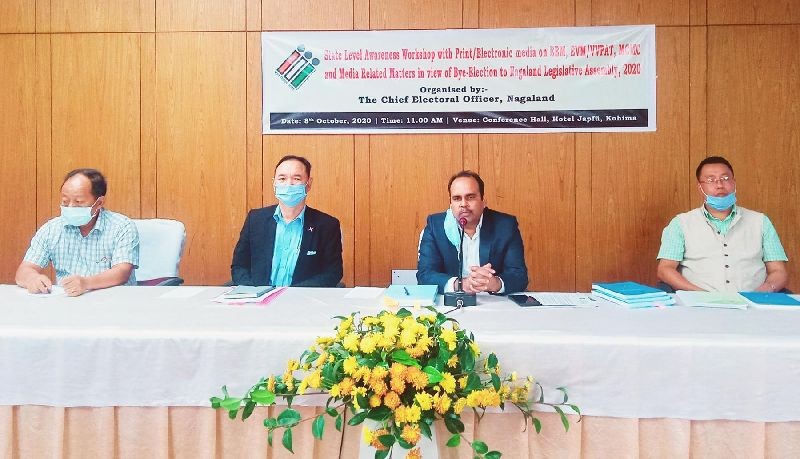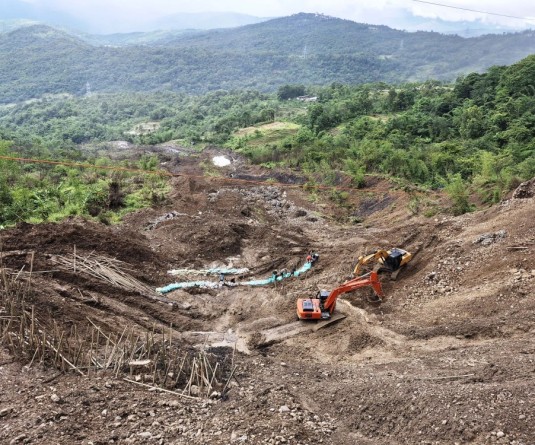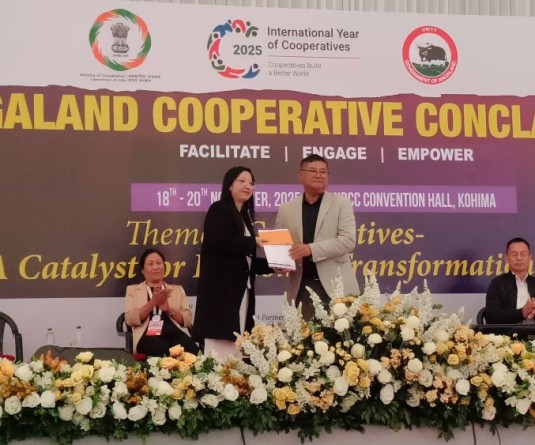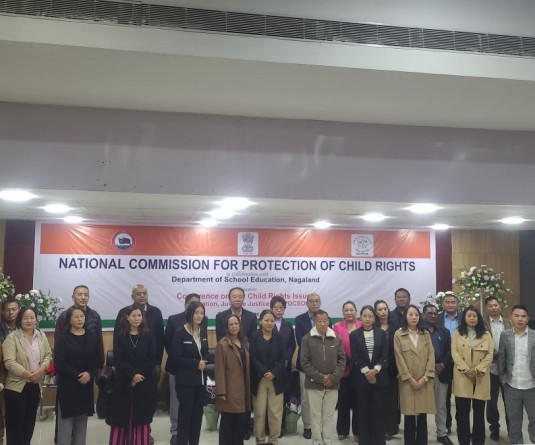Nagaland Chief Electoral Officer (CEO), Abhijit Sinha and other officials during the workshop in Kohima on October 8. (Morung Photo)

Our Correspondent
Kohima | October 8
In view of the forthcoming bye-elections to two seats of the Nagaland Legislative Assembly 2020, the Nagaland Chief Electoral Officer (CEO), Abhijit Sinha today conducted a state level awareness workshop with the print and electronic media at Hotel Japfu, Kohima.
The workshop focused on election expenditure monitoring, paid/fake news, Media Certification and Monitoring Committee (MCMC), EVM, VVPAT and other media related matters.
The bye-elections to the 14-Southern Angami-I A/C and 60-Pungro-Kiphire A/C seats will be held on November 3.
Election expenditure monitoring
Sinha informed that the Election Expenditure Monitoring (EEM) would work to ensure a level playing field, restricting expenditure within the ceiling limit, making candidates aware about the proper accounting of election expenditure, informing public that taking or offering bribe for their vote is an offence, and curtailing ostentatious expenditure in election campaign.
He also said that Static Surveillance Teams, Flying Squads and Video Viewing Teams would be deployed.
Sinha explained that election expenditure can be classified into two types on the basis of legal provisions—expenditure permissible under the law (public meetings, posters, banners, vehicle etc) and illegal expenditure (distribution of money, gifts, liquor or any other item among electors with the purpose of influencing them).
The CEO also informed that the Expenditure Observer (EO) would be responsible for overall supervision of expenditure monitoring and inspect the accounts of candidates. Candidates are required to produce their accounts for inspection 3 times or more before the EO or any officer authorized by him.
Regarding seizure of cash, he said that during checking by SSTs, if any cash exceeding Rs 50,000 is found in a vehicle carrying a candidate, or his agent or party worker or carrying posters or election materials or any drugs, liquor, arms or gift items (valued more than Rs. 10,000) which are likely to be used for inducement of electors, the same shall be subject to seizure.
Candidates are also required to mention the date, time, duration and location of public meetings/rallies along with expenditure plan for obtaining due permission.
Further, Sinha stressed that under the current circumstances, protocols with regard to COVID-19 have to be followed.
Clearance of political ads
Additional CEO, N Moa Aier meanwhile informed the media of certification for clearance of political advertisement before being telecast by any registered political party or by any group of organization/association or by any contesting candidate during elections.
The commission has issued instructions to appoint Media Certification & Monitoring Committees (MCMC) at District and State levels.
MCMCs pre-certify political advertisements on electronic media, including social media, take action on paid news cases and monitor media violations cases during election process. This will be done in principle with the Model Code of Conduct (MCC). The committee also keeps a check on criticism of other countries, attack on religions or communities, anything obscene or defamatory, incitement of violence, anything amounting to contempt of court, aspersion against the integrity of the President and Judiciary, anything affecting the unity, sovereignty and integrity of the Nation and any criticism by name of any person.
Aier said that all political advertisements appearing in the electronic media is to be pre-certified by MCMC during the time of elections. On poll day and one day before the polling, print media advertisements also need to be pre certified.
No paid news cases in Nagaland so far
Awa Lorin, Deputy CEO, Nagaland meanwhile informed that there has been no single case of paid news related matter in Nagaland so far.
The Press Council of India (PCI) defines paid news as any news or analysis appearing in any media (print & electronic) for a price in cash or kind as consideration. PCI guidelines say that news should be clearly demarcated from advertisements by printing disclaimers. A credit line and a separate typeface are also required to distinguish news.
He added that the recent rise of social media platforms has increased fake news substantially. Though paid news is not an electoral offence by law, Lorin informed that the issue has been a cause of concern for the Election Commission.
Lorin further stated that the ECI considers the media as its eyes and ears, especially at the time of elections, in order to shed light on electoral malpractices.
R Mhathung, Deputy CEO meanwhile spoke on EVMs and VVPAT which will be used in the forthcoming bye-elections.
Later, Ruokuovituo Khezhie, Joint CEO proposed vote of thanks and sought the cooperation of media houses for conduct of peaceful, free and fair elections.






